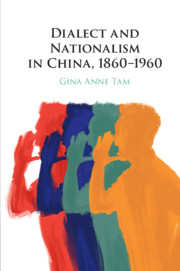Book contents
- Dialect and Nationalism in China, 1860–1960
- Dialect and Nationalism in China, 1860–1960
- Copyright page
- Dedication
- Contents
- Figures
- Acknowledgments
- A Note on Romanization and Characters
- Introduction
- 1 A Chinese Language
- 2 Unchangeable Roots
- 3 The Science of Language in Republican China
- 4 The People’s Language
- 5 The Mandarin Revolution
- Epilogue
- Works Cited
- Index
2 - Unchangeable Roots
Fangyan and the Creation of a National Language
Published online by Cambridge University Press: 28 February 2020
- Dialect and Nationalism in China, 1860–1960
- Dialect and Nationalism in China, 1860–1960
- Copyright page
- Dedication
- Contents
- Figures
- Acknowledgments
- A Note on Romanization and Characters
- Introduction
- 1 A Chinese Language
- 2 Unchangeable Roots
- 3 The Science of Language in Republican China
- 4 The People’s Language
- 5 The Mandarin Revolution
- Epilogue
- Works Cited
- Index
Summary
Chapter 2 analyses how late-Qing and early-Republican period efforts to construct a Chinese national language shaped debates over the role of fangyan in the modern Chinese nation. As reformers debated how best to modernize their nation through language by drawing upon philological studies of their own and the Western criticisms of Chinese society explored in Chapter 1, two narratives emerged. Some elites proposed that, because fangyan were an indispensable part of the nation, the national language should represent these, their shared, historical core. Others, drawing on the examples of France and Japan, contended that one fangyan should be chosen as a national representative and others should be demoted to variant status. Although in 1925 a language based almost entirely on the phonology of Beijing was chosen as the bedrock of the national language, these failed proposals created a precedent for centering Chinese collective identity on fangyan and, as a result, a basis for envisioning a more heterogeneous notion of national belonging. From local village bureaucrats to textbook producers, fangyan were portrayed as “roots” of a shared past, critical to forming a basis for a shared ethnic and national community.
- Type
- Chapter
- Information
- Dialect and Nationalism in China, 1860–1960 , pp. 72 - 110Publisher: Cambridge University PressPrint publication year: 2020

